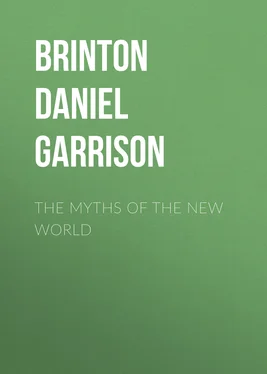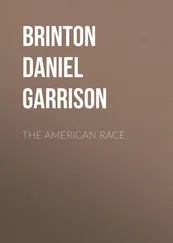Daniel Brinton - The Myths of the New World
Здесь есть возможность читать онлайн «Daniel Brinton - The Myths of the New World» — ознакомительный отрывок электронной книги совершенно бесплатно, а после прочтения отрывка купить полную версию. В некоторых случаях можно слушать аудио, скачать через торрент в формате fb2 и присутствует краткое содержание. Жанр: foreign_prose, История, Старинная литература, Мифы. Легенды. Эпос, foreign_edu, foreign_antique, на английском языке. Описание произведения, (предисловие) а так же отзывы посетителей доступны на портале библиотеки ЛибКат.
- Название:The Myths of the New World
- Автор:
- Жанр:
- Год:неизвестен
- ISBN:нет данных
- Рейтинг книги:5 / 5. Голосов: 1
-
Избранное:Добавить в избранное
- Отзывы:
-
Ваша оценка:
- 100
- 1
- 2
- 3
- 4
- 5
The Myths of the New World: краткое содержание, описание и аннотация
Предлагаем к чтению аннотацию, описание, краткое содержание или предисловие (зависит от того, что написал сам автор книги «The Myths of the New World»). Если вы не нашли необходимую информацию о книге — напишите в комментариях, мы постараемся отыскать её.
The Myths of the New World — читать онлайн ознакомительный отрывок
Ниже представлен текст книги, разбитый по страницам. Система сохранения места последней прочитанной страницы, позволяет с удобством читать онлайн бесплатно книгу «The Myths of the New World», без необходимости каждый раз заново искать на чём Вы остановились. Поставьте закладку, и сможете в любой момент перейти на страницу, на которой закончили чтение.
Интервал:
Закладка:
Richardson, Arctic Expedition , p. 374.
16
The late Professor W. W. Turner of Washington, and Professor Buschmann of Berlin, are the two scholars who have traced the boundaries of this widely dispersed family. The name is drawn from Lake Athapasca in British America.
17
The Cherokee tongue has a limited number of words in common with the Iroquois, and its structural similarity is close. The name is of unknown origin. It should doubtless be spelled Tsalakie , a plural form, almost the same as that of the river Tellico, properly Tsaliko (Ramsey, Annals of Tennessee , p. 87), on the banks of which their principal towns were situated. Adair’s derivation from cheera , fire, is worthless, as no such word exists in their language.
18
The term Algonkin may be a corruption of agomeegwin , people of the other shore. Algic, often used synonymously, is an adjective manufactured by Mr. Schoolcraft “from the words Alleghany and Atlantic” (Algic Researches, ii. p. 12). There is no occasion to accept it, as there is no objection to employing Algonkin both as substantive and adjective. Iroquois is a French compound of the native words hiro , I have said, and kouè , an interjection of assent or applause, terms constantly heard in their councils.
19
Apalachian, which should be spelt with one p, is formed of two Creek words, apala , the great sea, the ocean, and the suffix chi , people, and means those dwelling by the ocean. That the Natchez were offshoots of the Mayas I was the first to surmise and to prove by a careful comparison of one hundred Natchez words with their equivalents in the Maya dialects. Of these, five have affinities more or less marked to words peculiar to the Huastecas of the river Panuco (a Maya colony), thirteen to words common to Huasteca and Maya, and thirty-nine to words of similar meaning in the latter language. This resemblance may be exemplified by the numerals, one, two, four, seven, eight, twenty. In Natchez they are hu , ah , gan , uk-woh , upku-tepish , oka-poo : in Maya, hu , ca , can , uk , uapxæ , hunkal . (See the Am. Hist. Mag., New Series, vol. i. p. 16, Jan. 1867.)
20
Dakota, a native word, means friends or allies.
21
Rep. of the Commissioner of Indian Affairs, 1854, p. 209.
22
According to Professor Buschmann Aztec is probably from iztac , white, and Nahuatlacatl signifies those who speak the language Nahuatl , clear sounding, sonorous. The Abbé Brasseur (de Bourbourg), on the other hand, derives the latter from the Quiche nawal , intelligent, and adds the amazing information that this is identical with the English know all !! ( Hist. du Mexique , etc., i. p. 102). For in his theory several languages of Central America are derived from the same old Indo-Germanic stock as the English, German, and cognate tongues. Toltec, from Toltecatl , means inhabitant of Tollan, which latter may be from tolin , rush, and signify the place of rushes. The signification artificer , often assigned to Toltecatl, is of later date, and was derived from the famed artistic skill of this early folk (Buschmann, Aztek. Ortsnamen , p. 682: Berlin, 1852). The Toltecs are usually spoken of as anterior to the Nahuas, but the Tlascaltecs and natives of Cholollan or Cholula were in fact Toltecs, unless we assign to this latter name a merely mythical signification. The early migrations of the two Aztec bands and their relationship, it may be said in passing, are as yet extremely obscure. The Shoshonees when first known dwelt as far north as the head waters of the Missouri, and in the country now occupied by the Black Feet. Their language, which includes that of the Comanche, Wihinasht, Utah, and kindred bands, was first shown to have many and marked affinities with that of the Aztecs by Professor Buschmann in his great work, Ueber die Spuren der Aztekischen Sprache im nördlichen Mexico und höheren Amerikanischen Norden , p. 648: Berlin, 1854.
23
His opinion was founded on an analysis of fifteen words of the secret language of the Incas preserved in the Royal Commentaries of Garcilasso de la Vega. On examination, they all proved to be modified forms from the lengua general (Meyen, Ueber die Ureinwohner von Peru , p. 6). The Quichuas of Peru must not be confounded with the Quiches of Guatemala. Quiche is the name of a place, and means “many trees;” the derivation of Quichua is unknown. Muyscas means “men.” This nation also called themselves Chibchas.
24
The significance of Carib is probably warrior. It may be the same word as Guarani, which also has this meaning. Tupi or Tupa is the name given the thunder, and can only be understood mythically.
25
The Araucanians probably obtained their name from two Quichua words, ari auccan , yes! they fight; an idiom very expressive of their warlike character. They had had long and terrible wars with the Incas before the arrival of Pizarro.
26
Since writing the text I have received the admirable work of Dr. von Martius, Beiträge zur Ethnographie und Sprachenkunde Amerika’s zumal Brasilians , Leipzig, 1867, in which I observe that that profound student considers that there is no doubt but that the Island Caribs, and the Galibis of the main land are descendants from the same stock as the Tupis and Guaranis.
27
Comptes Rendus , vol. xxi. p. 1368 sqq.
28
The two best authorities are Daniel Wilson, The American Cranial Type , in Ann. Rep. of the Smithson. Inst. , 1862, p. 240, and J. A. Meigs, Cranial Forms of the Amer. Aborigs. : Phila. 1866. They accord in the views expressed in the text and in the rejection of those advocated by Dr. S. G. Morton in the Crania Americana.
29
Second Visit to the United States , i. p. 252.
30
Martius, Von dem Rechtzustande unter den Ureinwohnern Brasiliens , p. 80: Muenchen, 1832; recently republished in his Beiträge zur Ethnographie und Sprachenkunde Amerika’s : Leipzig, 1867.
31
Athapaskische Sprachstamm , p. 164: Berlin, 1856.
32
Martius, Von dem Rechtzustande unter den Ureinwohnern Brasiliens , p. 77.
33
But there is no ground for the most positive of philosophers to reject the doctrine of innate ideas when put in a certain way. The instincts and habits of the lower animals by which they obtain food, migrate, and perpetuate their kind, are in obedience to particular congenital impressions, and correspond to definite anatomical and morphological relations. No one pretends their knowledge is experimental. Just so the human cerebrum has received, by descent or otherwise, various sensory impressions peculiar to man as a species, which are just as certain to guide his thoughts, actions, and destiny, as is the cerebrum of the insectivorous aye-aye to lead it to hunt successfully for larvæ.
34
Die Kunst im Zusammenhang der Culturentwickelung , i. pp. 50, 252.
35
I offer these derivations with a certain degree of reserve, for such an extraordinary similarity in the sound of these words is discoverable in North and portions of South America, that one might almost be tempted to claim for them one original form. Thus in the Maya dialects it is ku , vocative â kue , in Natchez kue-ya , in the Uchee of West Florida kauhwu , in Otomi okha , in Mandan okee , Sioux ogha , waughon , wakan , in Quichua waka , huaca , in Iroquois quaker , oki , Algonkin oki , okee , Eskimo aghatt , which last has a singular likeness in sound to the German or Norse, O Gott , as some of the others have to the corresponding Finnish word ukko . Ku in the Carib tongue means house , especially a temple or house of the gods. The early Spanish explorers adopted the word with the orthography cue , and applied it to the sacred edifices of whatever nation they discovered. For instance, they speak of the great cemetery of Teotihuacan, near Tezcuco, as the Llano de los Cues .
Читать дальшеИнтервал:
Закладка:
Похожие книги на «The Myths of the New World»
Представляем Вашему вниманию похожие книги на «The Myths of the New World» списком для выбора. Мы отобрали схожую по названию и смыслу литературу в надежде предоставить читателям больше вариантов отыскать новые, интересные, ещё непрочитанные произведения.
Обсуждение, отзывы о книге «The Myths of the New World» и просто собственные мнения читателей. Оставьте ваши комментарии, напишите, что Вы думаете о произведении, его смысле или главных героях. Укажите что конкретно понравилось, а что нет, и почему Вы так считаете.












